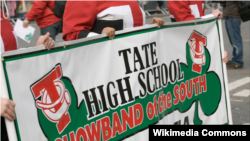Student Union
Homecoming Queen at Center of Alleged Voter Fraud in Florida

After a long political season in the United States, where “voter fraud” was often the cry above a noisy campaign, a case has emerged in Florida involving the alleged illegal election of a high school homecoming queen.
Homecoming queens are the stars of the show at the end of football season in October or November, elected by their high school peers in a popularity contest that can linger a lifetime. Teenage queens and kings arrive dressed in gowns and tiaras and tuxedos, and with a large bouquet of flowers and sashes in one hand declaring their status, wave from their perch on the back of a convertible that slowly circles a hometown football field, usually under tall bright lights.
But the homecoming queen at Tate High School in Florida, along with her mother, are accused of rigging the election and stealing dozens of votes in the girl’s favor.
An investigation into Laura Rose Carroll, 50, and her daughter, 17, is looking into whether Carroll — who has been suspended from her job as an assistant principal in the Escambia County school system — hacked into electronic school records in October 2020 and voted nearly 250 times from two IP addresses for her daughter’s candidacy, according to state law enforcement officials.
The homecoming votes weren’t the only files accessed. Court documents show the accounts concerning student grades, attendance, medical history and other personal and proprietary information had been hacked.
The mother and daughter were arrested Monday. They face one count each of offenses against users of computers, computer systems, computer networks, and electronic devices (a third-degree felony), unlawful use of a two-way communications device (a third-degree felony), criminal use of personally identifiable information (a third-degree felony) and conspiracy to commit these offenses (a first-degree misdemeanor), according to a Florida Department of Law Enforcement (FDLE) statement published on its website Monday.
“Multiple students reported that the daughter described using her mother’s FOCUS account to cast votes,” according to the FDLE statement. The investigation also found that Carroll had accessed 372 high school records, of which 339 were of Tate High School students. FOCUS is the school’s online student portal.
“I have known that [Carroll's daughter] logs into her mom’s school account in order to access grades and test scores since freshman year when we became friends,” said one witness in court documents. “She looks up our group of friends’ grades and makes comments about how she can find out our test scores all the time.”
A second witness said they recalled “times when [Carroll's daughter] logged onto her mom’s FOCUS account and openly shared information, grades, schedules, etc. with others. She did not seem like logging in was a big deal and was very comfortable doing so.”
Carroll was booked into the Escambia County Jail on Monday, according to the FDLE and Escambia County Sheriff’s Office. She was later released on $8,500 bond, according to the FDLE. Her daughter was being held in the Escambia Regional Juvenile Detention Center.
See all News Updates of the Day
- By VOA News
Competition grows for international students eyeing Yale

It’s tough to gain admission to Yale University, and it’s getting even tougher for international students as standout students from around the world set their sights on Yale.
The Yale Dale News, the campus newspaper, takes a look at the situation here.
- By VOA News
Student from Ethiopia says Whitman College culture made it easy to settle in

Ruth Chane, a computer science major from Ethiopia, writes about her experiences settling into student life at Whitman College in the U.S. state of Washington.
"The community at Whitman College made sure I felt welcomed even before I stepped foot on campus," she says.
- By VOA News
Claremont Colleges student gets a shock when she heads home to Shanghai

In The Student Life, the student newspaper for the Claremont Colleges, a consortium of five liberal art colleges and two graduate schools in Claremont, California, student Rochelle Lu writes about readjusting to her Shanghai home after spending a semester in the United States.
- By VOA News
Cedarville University aims to ease transition for international students

Cedarville University in the U.S. state of Ohio says it’s got more than 140 international students representing 44 countries.
Here, the school interviews Jonathan Sutton, director of international student services. He talks about his job and the opportunities for international students on campus.
- By VOA News
Morehouse College offers prospective students tips on applying and thriving

Morehouse College, a private, historically Black liberal arts college in the U.S. state of Georgia, offers a guide for international students interested in attending the school.
Among the tips to apply and thrive at Morehouse:
- Take advantage of the school’s orientation program
- Turn to the school’s Center for Academic Success for tutoring, support and more
- Immerse yourself in campus life via clubs and societies